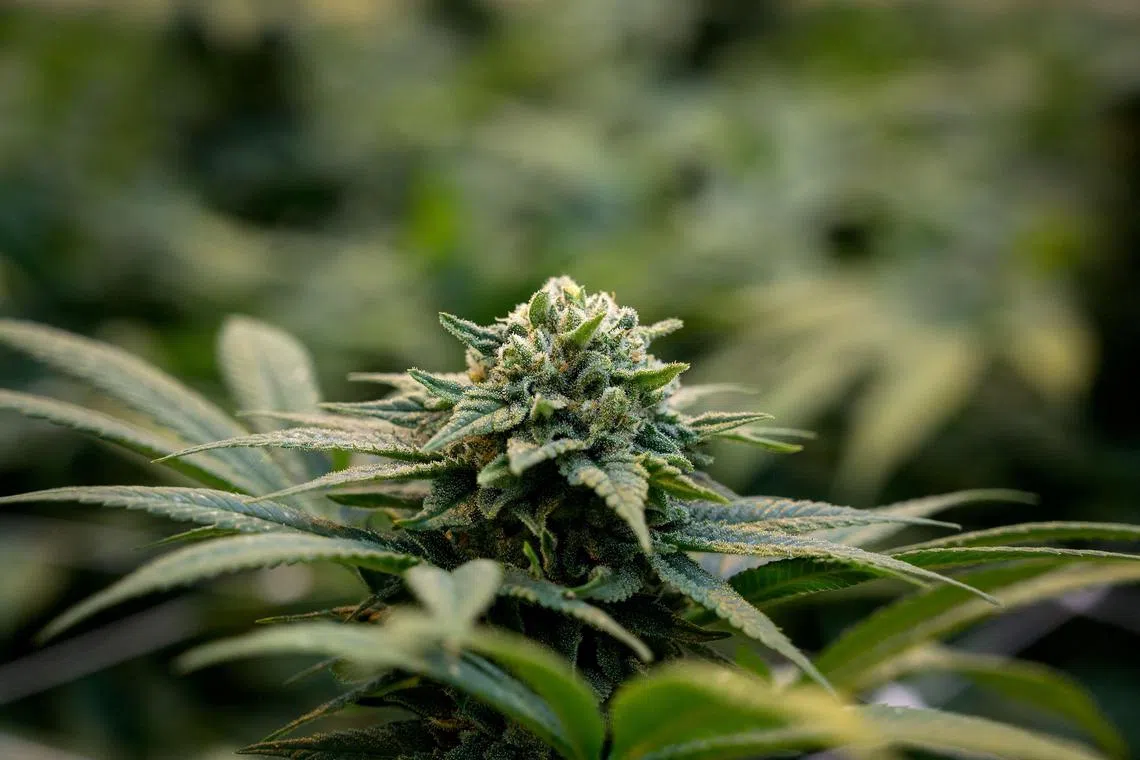South Korea’s chaebol scions indicted for using, distributing marijuana
Sign up now: Get insights on Asia's fast-moving developments

So far, 20 people have been indicted on charges of drug distribution in 2022. Cannabis is an illegal drug in South Korea.
PHOTO: AFP
SEOUL - South Korean prosecutors said on Thursday they have indicted 17 people on charges of distributing cannabis in the country, where owning and using the substance are strictly prohibited.
Among them were six scions of Korean chaebol, or family-owned conglomerates, a son of a high-ranking official, entrepreneurs, a musician and an entertainment agency chief, according to the Seoul Central District Prosecutors’ Office, ending a months-long probe since September 2022.
According to local reports, the chaebol scions included a third-generation heir of dairy product maker Namyang Dairy Products, an heir from metal product manufacturer KIS Wire, an heir of provincial bank JB Financial Group and an heir of chemical-to-machinery firm Hyosung. Prosecutors declined to confirm their identities.
So far, 20 people have been indicted on charges of drug distribution in 2022, as cannabis is categorised as an illegal drug in South Korea.
The accused have formed an exclusive group to get access to drugs face-to-face. Most of them were in their late 30s or early 40s, according to prosecutors.
“Most of the accused studied abroad at the younger age ... so they got to know each other and created an exclusive human network to trade drugs,” said Mr Shin Jun-ho, drug and organised crime deputy chief prosecutor of Seoul Central District Prosecutors’ Office.
“Drug trading on social networks without buyers and sellers meeting face-to-face are becoming a growing problem. Drugs can be distributed indiscriminately through these methods, but in this case, those within the exclusive network of people met to trade drugs.”
Ten of the indicted have been detained for buying cannabis multiple times and possessing it to smoke or vape it. Some were accused of growing cannabis at home or inside a tangerine farm in Jeju Island without authorisation. One grew cannabis inside a house where adolescent children lived together, and another smoked it during a trip to a foreign country with his pregnant wife.
Prosecutors have placed three -- a chaebol scion among them – who fled Korea on a wanted list.
Mr Shin told a press briefing that investigators have seized no more than 1kg of cannabis powder and cannabis vape liquids combined so far. He did not disclose the value of the confiscated products, nor the level of penalty charge to be imposed on the indicted.
What enabled the indictment, he added, was a law revision which went into effect in September 2022, allowing prosecutors to retain the right to investigate drug distributing crimes. The revision was a change of course from the decision during the former Moon Jae-in administration to restrict prosecutors’ investigative power and transfer most of the power to the police.
Mr Shin also pointed to a “mistake” in the police’s investigation. Cannabis-growing tents run by one of the detained were left unattended, and prosecutors later seized the tents as they regained investigative power.
“This case shows that prosecutors with investigative power can bring an investigation to an end,” Mr Shin said.
The revelation was a follow-up from its announcement in December 2022, where six people – including some chaebol scions -- were indicted. Three were indicted without detention.
South Korea is increasingly prone to cannabis-related crimes due to addiction among users. According to data from the Supreme Prosecutors’ Office, nearly 40 per cent of those caught for cannabis-related crimes were repeat offenders. The number of criminals in 2021 rose 17.6 per cent to 3,777, marking an increase for three consecutive years.
Mr Shin said Korean prosecutors will work to keep Korea from cannabis distribution, calling cannabis a “gateway drug” that precedes the use of other illegal substances.
This is in line with the announcement by the Ministry of Justice on Thursday to create special teams of drug crime investigators across the nation, teams dedicated to encrypted internet at which digital drug trades are being frequented, as well as a joint information-sharing system of the police and prosecutors. THE KOREA HERALD/ASIA NEWS NETWORK


